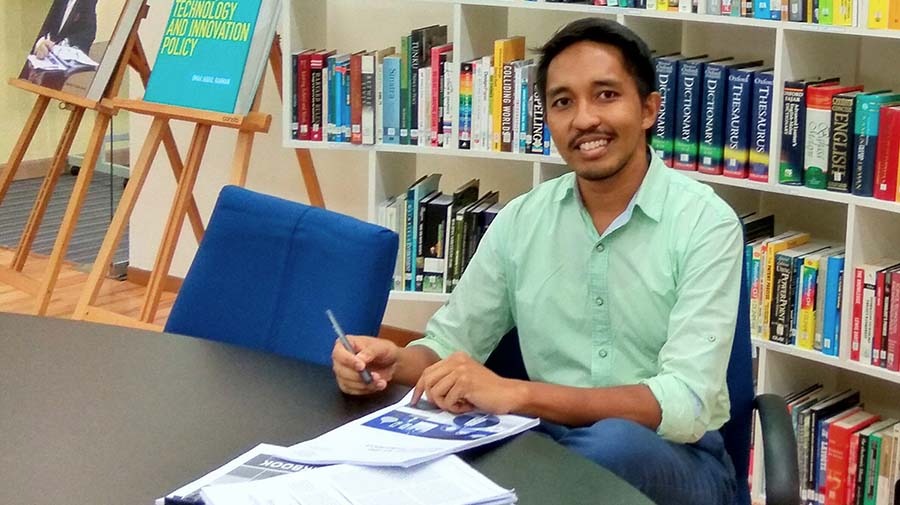
Wan Abdul Matiin is leveraging his Master’s degree in Water and Environmental Engineering to bridge the gap between scientists and decision makers as a science writer at the Academy of Sciences Malaysia (ASM) – a think tank for scientific advocacy, policy, and strategy under the purview of the Malaysian Ministry of Science, Technology and Innovation.
His latest project at ASM is a futures study for Malaysia, which involves anticipating scenarios for the year 2050 and developing a strategic roadmap that leverages current trends in science, technology, and other aspects of development.
“I love distilling complex ideas in science and technology into strategic, compelling narratives that can reach a wider audience to elevate scientific literacy among the younger generations,” Matiin shared. In his current role, Matiin blends his investigative curiosity with his passion for high-impact scientific communication to help shape the future of Malaysia’s science and technology agenda.
Following his passion to elevate scientific literacy among the younger generation, Matiin also works as a STEM instructor at Axiom Learning – a unique center that offers one-on-one support to children of all ages and learning styles. As an instructor, Matiin helps to bridge students’ learning gaps, develop their confidence, and take progressive steps towards their independence.
In addition to raising scientific awareness among policy makers and children, Matiin works to raise knowledge about something else close to his heart – sustainable food systems.
“My key interest in sustainability is in the water-food-energy nexus of sustainable development, which is why I decided to get involved in projects dedicated to establishing sustainable food systems in Malaysia,” Matiin said.
After receiving a Permaculture Design certificate and becoming a LEED Green Associate, Matiin helped found Urban Hijau, a community farm initiative in his native Malaysia that produces organic fruits and vegetables for the wider community while educating them about the practices of permaculture. The grassroots startup is providing Malaysians and people all over the world with a positive example of how a closed-loop, independent, and synergistic agricultural system can produce food sustainably while supporting greater water, food and energy security.
Matiin credits Masdar Institute for his success as an entrepreneur, science writer and educator, and for rekindling in him a passion for sustainability.
“The high-caliber research we pursued at Masdar Institute and the rigorous discourse that took place at our seminars, meeting rooms, lunch tables and over coffee has been critical in helping me hone solid analytical skills and a worldly outlook, and synergize my technical fluency with eloquent communication,” Matiin shared.
The process of writing an op-ed on his thesis research, which was on the process of bio-mineralization carried out by soil bacteria inhabiting Abu Dhabi’s hypersaline sabkhas, or salt flats, gave him his first experience of science writing. A paper he co-authored on his thesis research was recently published in the journal Desalination & Water Treatment.
“In building my experience as a young scientist at MI, I learned that there is a pressing need for science to be communicated in more powerful ways to stakeholders. This is especially critical in light of contemporary issues revolving around climate change, sustainable development, and public health, where limited understanding and misinformation threaten our progress as a society. I am thankful for the diverse forms of support I gained from my peers, mentors and friends at MI and beyond towards pursuing my passion for science communication,” Matiin remarked.
After he graduated, Matiin stayed at Masdar Institute for two years as a Research Engineer and Lab Manager at the Institute’s Bio-Energy and Environmental Lab (BEEL). During that time, Matiin further developed his technical, organizational and scientific communication skills by coordinating day-to-day research activities and articulating these research activities to the public through the lab’s website and scientific op-eds.
During his time at Masdar Institute Matiin also contributed to the student community newsletter, called TaQa, where he wrote, edited and designed work related to research and the diverse MI student body. Matiin’s portfolio of written work published in TaQa, along with the op-ed he wrote for the local daily The National, helped him land his current science writing role.
The young science writer plans to continue working to improve public understanding of science and sustainable food systems in order to ensure that the innovative scientific research needed to change the world continues.
Erica Solomon
News and Features Writer
26 September 2016